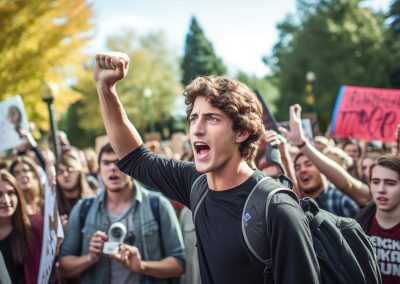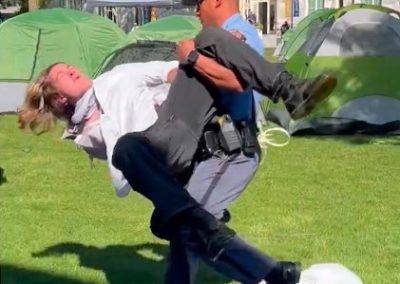Times are tough. That may very well be an understatement. Law enforcement culture nationwide is under attack from multiple angles. Media, social media and #hashtag activists have all rendered their opinions. Recently, a highly-paid professional football player has “demanded” that each and every Attorney General in all 50 states investigate police training, tactics, and lesson plans. Just two weeks ago I was sitting in my patrol car at a red light when a 20-something rolled down his window, extended his left arm, and flipped me off as he drove by.
New videos surface almost every day that seemingly paint a bleak picture—especially as talking heads peddle a false narrative when describing the videos (usually heavily edited).
There’s no need to go on with more examples of what makes policing difficult today. You are all painfully aware. My question to the Field Training Officers in the country is this: What is our role during these turbulent times? How can FTOs help stabilize our current condition and move us forward into the future?
The FTO’s Role
The FTO is a crucial link in the chain to the development of law enforcement culture. I feel the answer to my question lives in all three dimensions of time. What we are experiencing in the present, forces us to look for guidance from our past, and understand how we shape the future.
Field training programs came to be when police departments realized that our profession as a whole was in need of standardized training. We sought to create uniformed understanding of laws, policy, and best practices. Over the next several decades we learned that police trainers taught much more than tactics and procedures. They also developed the personality and attitude of young officers.
We must keep reverence for all that is good and honorable about our past. At the same time we much fully understand how much of an impact we have at shaping the future. How we choose to react to our current climate is critical for the future of our profession. As teachers and trainers we can play a critical role in maintaining a positive culture or we can have a negative effect on the attitude and personality of officers for decades to come.
With all this in mind, I feel that there are three essential ideas we need to keep in mind when we train our new student officers.
Remember the support. First, we need to believe that the majority of the communities we serve support us. I’ve read a few articles about the vocal minority who oppose law enforcement. Seems like the consensus number of citizens who actually stand to oppose law enforcement is about 3% nationwide. However, we are fully aware that they have the microphone, the spotlight, and center stage right now.
Reminding yourself that the majority of citizens appreciate you will have to be something you intentionally do. This may be a state of mind that you will need to create and keep in the forefront of your mind.
My home agency has been flooded with cards, cookies, cakes, and posters from local students. All of them are a note of support for our service and commitment to our community. One particular private elementary school has developed a “Pray for a Cop” program. My friends and I in local agencies here in Arizona have experienced an upswing in public handshakes, anonymous gift cards and meals, and a heart-felt “thank yous” in public. Hopefully you have experienced the same.
Don’t hide. Second, we cannot retreat and hide in the shadows. The most noble response to the criticism we unjustly receive is to remain resolved to our oath. When you were sworn into service did you give an oath to never betray your badge? To uphold public trust? Uphold the Constitution? To display courage and serve the public? We live out our oath and our resolve by remaining in public view, proactively fighting crime, objectively enforcing laws, and offering to take point when so many others will not.
If we make the choice to retreat we have to realize two consequence. First, that’s your choice. The present-day atmosphere surrounding law enforcement can feel suffocating. But the nightly news, hashtags, Facebook videos, and other weapons of insult do not force us into hiding. That is a personal decision we make.
Second, if we choose to hunker down, they win. Those who wish to throw sticks and stones to embarrass us, discredit us, and discourage us will indeed accomplish their goal. Criminals will be emboldened.
Stand your ground and choose to forge on as you always have. Remember, smooth seas do not make skilled sailors. These turbulent waters will almost certainly make you a better cop.
Strive for better. Lastly, our current era of law enforcement cannot accept average and routine in the training world. Field trainers and in-service instructors need to know our contribution to students now has to be above average. We need full commitment to in-depth training that clearly address the current needs of the law officer today.
I feel that our profession will certainly look different once we’ve weathered this storm. That’s not new. We’ve lived through significant change before. The question is, what will it look like? What shape will culture, tactics and procedures take when the dust settles? No one knows. But, I do know that quality and passionate trainers will help shape that future. Our contribution to the change can ease the transition. Our skills, talents, ideas and passion can grease the gears as changes take place. And, it will require the best effort you can give as a trainer to achieve a desired outcome.
Conclusion
In more than 20 years on the job I’ve seen countless changes to policy and procedure. Tactics come and go. I’ve lived through the death of friends, the prosecution of a friend who was accused of excessive force, and I’ve even been the headline news for our local paper for a few days. I can tell you that after each of these critical times, there was change. The impact of the moment affected policy in some way. At the end of the day, when it was time to enact that change, it was always the dedicated FTO and LE instructors that stepped up to ease the pain of change.
I’m confident that it will be the same today. My faith is in you, the trainer, as it always has been. Stay safe.










0 Comments